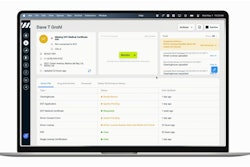A recent survey of more than 2,000 fleet professionals highlighted a growing appetite for generative AI with GPT solutions currently used in a limited way by 40.8% of respondents and extensively by 10.7%.
According to the survey by EVAI, a company that specializes in advanced data analytics and AI-driven solutions for fleet management, 38.8% are not currently using GPT interfaces but are actively considering them.
There are many considerations for fleets as they begin the journey into AI, from AI readiness to data quality, as several Trimble AI experts discussed recently during the company’s “Connecting the World: AI Innovations in Global Transportation & Logistics” media roundtable event.
Those experts also discussed the best ways for fleets to dip their toes into the water of AI once they’re ready to take that step.
While some trucking companies, like GP Transco and Grand Island Express, have taken steps to develop their own AI solutions in-house, Trimble’s sector vice president, transportation and logistics, Michael Kornhauser said most should not be heavily developing their own AI, though that could change as generative AI is rapidly evolving.
In the meantime, he said there are many off-the-shelf AI productivity tools, including options from Trimble’s set of solutions. AI is already in the cab in some use cases. There are many providers of in-cab technology like dash cameras that are already using AI for things like driver drowsiness detection, but one of the best places to get started, Kornhauser said, is in back-office operations.
“I would argue that there are a lot of efficiencies that can be gained in just the general back-office running of a trucking company before we put too much into the truck,” Kornhauser said. “We're not going to use agents to drive the truck anytime in the next couple of years, so I think that there are a lot of areas to focus on in the back-office operations area to leverage AI.”
Philipp Pfister, sector vice president at Transporeon, Trimble’s European-based TMS, agreed, adding that another area where AI can help with efficiency gains is in deal-making and business generation.
Trimble Chief Product and Technology Officer Jonah McIntire said one example is using AI for the ingestion of emails and converting them into systemic transactions. Say a customer sends a carrier an email that asks for the rate and lead time on a particular shipment.
“Right now, there's human glue in most companies that would sit there and structure that over into something else and then maybe look up cost structures, or go try to find what the cost would be, and then decide how much margin to add on top of that, and then reply back,” McIntire said. “Those are things that are fully automated for some of our customers now because we use generative AI for that.”
For business generation, he suggested trucking companies invest in tools like Gemini or OpenAI (creator of ChatGPT) for staff in research or communication capacities.
[RELATED: Advantages and disadvantages of using AI resources in fleet operations, including ChatGPT]
One use case would be a sales department using these tools to research and report on a particular company that it is seeking to do business with. Those tools could pull information like key staff members, company stats like revenue, news-related items, etc. to prepare a briefing for the salesperson so they can have knowledge about their prospective client without having to do the work themselves.
“Because you used Gemini, it might go search and read like 100 web pages to answer to prepare that. The equivalent period of preparation would have taken (a human) a couple hours, and now it's available to them in maybe five minutes, and it takes them another 10 minutes to read,” McIntire said. “There are a lot of little islands of amazing productivity.”
For those already using GPT interfaces, 30.1% report 8% to 10% efficiency increases, according to EVAI’s survey. An additional 9.7% report improvements of 15% or more, and 29.1% of potential AI adopters anticipate a 10% to 12% efficiency gain if implemented.
“We have AI that is performing better at certain tasks than humans,” Kornhauser said. “That's obviously pretty powerful.”












